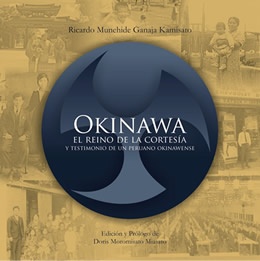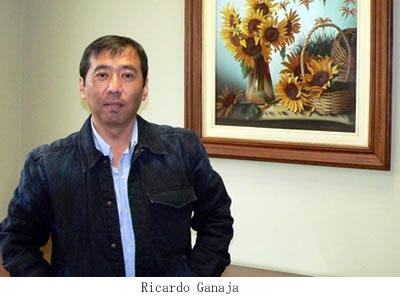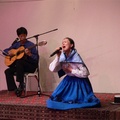Ricardo Munehide Ganaja Kamisato juntó las palmas de sus manos e hizo una reverencia. Iba dirigida a su fallecida abuela. Luego entró a la casa en ruinas. Casi no podía creer que la construcción, en medio de la densa selva de Okinawa, siguiera en pie. Su obaachan la había dejado atrás para emigrar al Perú hace casi un siglo. Entonces ella tenía alrededor de 20 años.
Era el año 2006. Ricardo había viajado del Perú a Okinawa para participar del cuarto Uchinachu Taikai. El evento congrega a los inmigrantes okinawenses de alrededor del mundo y sus descendientes. Hasta antes de ir, Ricardo no tenía ningún sentimiento especial por su ascendencia. Solamente recordaba las historias de su abuela, quien siempre le contaba de su tierra natal y hablaba en uchinaguchi (dialecto okinawense).
El hogar desconocido
Ricardo o Hide, como le dicen, había viajado en dos ocasiones a Japón antes de 2006. En ellas nunca pudo visitar Okinawa. Tuvo algunas experiencias gratas, producto del tradicional buen trato y la hospitalidad del país. Sin embargo, también tuvo experiencias amargas. Una de ellas fue cuando estuvo en Tokio y en un restaurante los meseros no lo atendieron al escuchar que hablaba español. Su amigo luego le explicó que la discriminación fue producto de que lo creyeron un dekasegi, un trabajador inmigrante, que en muchos casos es nikkei. Perdió la poca identificación japonesa que tenía en ese entonces a raíz de esta experiencia.
En el 2006 Hide reencontró su identidad nipona. En el Uchinanchu Taikai fue recibido con un ¡¡okaerinasai!! Esta cálida palabra, que se dice para recibir al que regresa a su hogar, le sorprendió sobremanera. Su apellido sonaba familiar en el lugar y ya no tenía que repetirlo para que lo entiendan. Su tono de piel, más oscuro que el de un japonés de otras prefecturas, era común en los habitantes del lugar. A donde quiera que iba lo trataban como a un paisano, a pesar de que no hablaba el mismo idioma. Hasta las ancianas del lugar le recordaban a su abuela. Definitivamente se sentía en casa.
Hombre de palabra
Luego del taikai, Hide decidió aprovechar su estadía para visitar la antigua casa de su abuela. Un primo lejano, residente okinawense, lo llevó al lugar. Estaba ubicado dentro de la selva, alejado de la población. Así es como llegó a la casa abandonada. Una vez dentro, caminó unos pasos. Se detuvo de pronto, observando hacia el exterior. La frondosa vegetación, las montañas, el camino... Veía el mismo paisaje que su obaachan vio hace cien años. Sintió una conexión con ella que trascendió al tiempo. Conmovido, le hizo una promesa...
Dos años después, Hide está a punto de cumplir el compromiso hecho con su abuela. Éste era el de escribir y publicar un libro sobre Okinawa. En julio de este año presentará en el Centro Cultural Peruano Japonés; Okinawa, el reino de la cortesía y testimonio de un peruano okinawense.
El libro intercala la narración en dos planos distintos. Uno cuenta la historia de Okinawa desde sus orígenes como el reino de Ryukyu. El otro, la experiencia del autor como peruano descendiente okinawense. Como tal, Hide admite que casi toda la vida tuvo una pregunta en la cabeza: ¿Quién soy?
¿Peruano? ¿Japonés? ¿Okinawense?... ¿Chino?
La parte testimonial de la obra de Hide narra diversas experiencias paradójicas, familiares para muchos nikkei. Paradojas como tener que cantar el himno nacional en el colegio y luego ser molestado de extranjero en su barrio. La historia de sus primeras visitas a Japón, que incluyeron la experiencia de la discriminación. Ser recibido con mucha alegría en Okinawa, como un paisano más. Incluso cuenta cómo se fastidiaba de ser llamado “chino” y posteriormente descubrió en Okinawa que poseía ascendencia china (algo típico en Okinawa, de fuertes raíces culturales chinas).
Hide encontró mucho de sí mismo al visitar Okinawa. Quiere que las futuras generaciones experimenten un poco de esto al leer su libro. Éste es también para lectores sin ascendencia uchinanchu, pues responde a una pregunta universal de manera positiva. ¿Quién soy? Soy el crisol de muchas culturas.
* Este artículo fue publicado en la revista Kaikan Nº 34 (junio de 2008) de la Asociación Peruano Japonesa (APJ), afiliado a Discover Nikkei.
© 2008 Asociación Peruano Japonesa and Asociación Peruano Japonesa and Yamato Icochea Oshima






